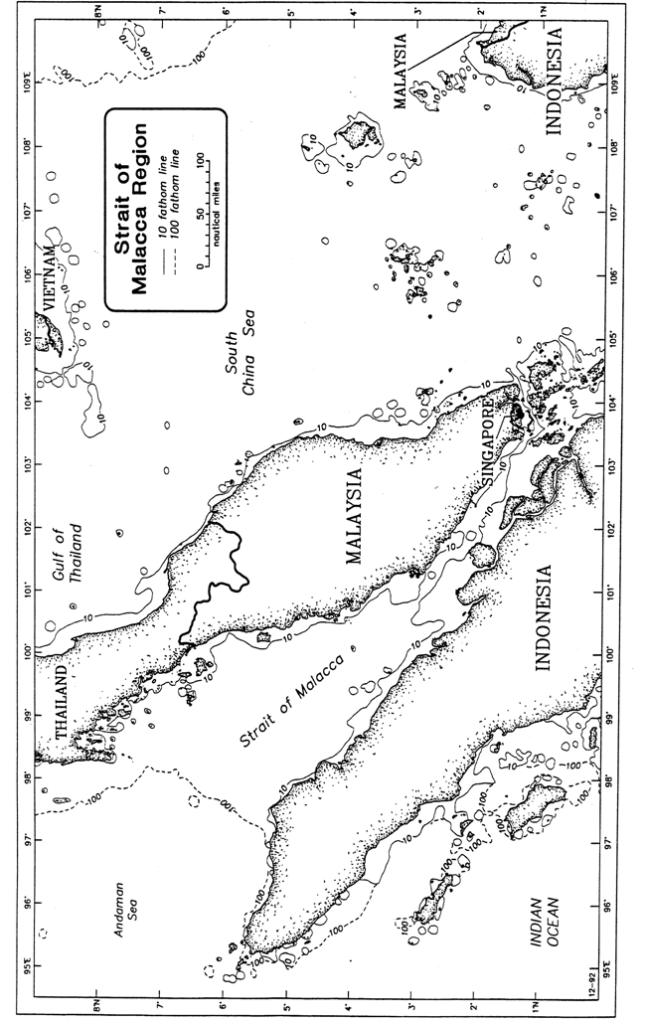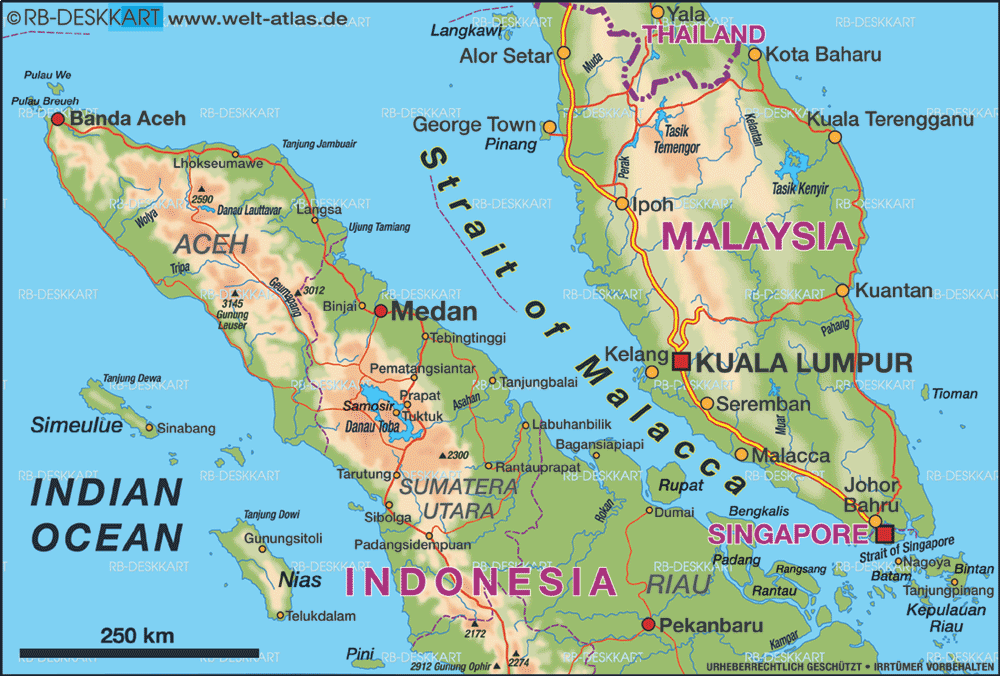The Straits of Malacca and Singapore extend for approximately 600 miles.
(See Map 33.) The Strait of Malacca is located between the east coast of the Indonesian island of Sumatra and the west coast of peninsular, or west, Malaysia.
The Singapore Strait is located south of the island of Singapore and the
southeastern tip of peninsular Malaysia, and north of the Indonesian Riau
Islands. The straits provide the shortest sea route between the Indian Ocean
(via the Andaman Sea) and the Pacific Ocean (via the South China Sea).
At the broad western entrance to the Strait of Malacca, the littoral coasts of
Indonesia and Malaysia are separated by about 200 miles. The strait, however,
begins to funnel in a southeasterly direction. At 3°N and south of One Fathom
Bank, the territorial sea of Indonesia and Malaysia overlap. The narrowest part
of the Strait of Malacca is at the southwestern tip of the Malay Peninsula –
8.4 miles wide, and, given the shallow depth, is much narrower for deep
draught vessels.
The narrowest breadth of the Singapore Strait is only 3.2 miles and throughout
its length is constantly less than 15 miles wide (the combined territorial
seas claimed by Indonesia (12 miles) and Singapore (3 miles)). At its eastern
outlet into the South China Sea, where it is bounded solely by Malaysia and
Indonesia, the sea passage is approximately 11.1 miles wide.
The governing depth of the Strait of Malacca is less than 75 feet, with a tidal
range between 4.6 feet at the eastern outlet of the Singapore Strait and 12.5
feet at the western entrance to the Strait of Malacca.
On April 29, 1982, Ambassador James L. Malone, United States Representative
to the Third United Nations Conference on the Law of the Sea, submitted
a letter to the President of the Conference “confirm[ing] the contents” of a
letter dated April 28, 1982, from the Chairman of the Malaysian delegation
on behalf of the delegations of Indonesia, Malaysia and Singapore, regarding
their statement concerning the purpose and meaning of article 233 of the LOS
Convention in its application to the Straits of Malacca and Singapore. The
Malaysian statement reads:
Following consultations held among the delegation of States concerned, a common
understanding regarding the purpose and meaning of article 233 of the draft
convention on the law of the sea in its application to the Straits of Malacca and
Singapore has been confirmed. This understanding, which takes cognizance of
the peculiar geographic and traffic conditions in the Straits, and which recognizes
the need to promote safety of navigation and to protect and preserve the marine
environment in the Straits, is as follows:
- Laws and regulations enacted by States bordering the Straits under article 41,
paragraph 1(a) of the convention, refer to laws and regulations relating to traffic separation schemes, including the determination of under keel clearance for the Straits provided in article 41.
- Accordingly, a violation of the provisions of resolution A.375(X), by the
Inter-Governmental Maritime Consultative Organization adopted on 14
November 1977, whereby the vessels referred to therein shall allow for an
under keel clearance of at least 3.5 metres during passage through the Straits
of Malacca and Singapore, shall be deemed, in view of the particular geographic
and traffic conditions of the Straits, to be a violation within the
meaning of article 233. The States bordering the Straits may take appropriate
enforcement measures, as provided for in article 233. Such measures may
include preventing a vessel violating the required under keel clearance from
proceeding. Such action shall not constitute denying, hampering, impairing
or suspending the right of transit passage in breach of articles 42, paragraph
2, or 44 of the draft convention. - States bordering the Straits may take appropriate enforcement measures in
accordance with article 233, against vessels violating the laws and regulations
referred to in article 42, paragraph 1(a) and (b) causing or threatening major
damage to the marine environment of the Straits. - States bordering the Straits shall, in taking the enforcement measures, observe
the provision on safeguards in Section 7, Part XII of the draft convention. - Articles 42 and 233 do not affect the rights and obligations of States bordering
the Straits regarding appropriate enforcement measures with respect to
vessels in the Straits not in transit passage. - Noting in the above understanding is intended to impair:
(a) the sovereign immunity of ships and the provisions of article 236 as well
as the international responsibility of the flag State in accordance with
paragraph 5 of article 42;
(b) the duty of the flag State to take appropriate measures that its ships
comply with article 39, without prejudice to the rights of States bordering
the Straits under Parts III and XII of the draft convention and the
provisions of paragraphs 1, 2, 3 and 4 of this statement.
The International Maritime Organization has established other rules for vessels
navigating the Straits of Malacca and Singapore, including traffic separation
schemes at One Fathom Bank and in the Singapore Straits and deep water
routes forming part of the eastbound traffic lane of the traffic separation scheme
in the Singapore Strait. On implementation of Article 43 on cooperation,
see section 11.7.2 above. On proposals to build a bridge over the straits,
see section 11.8.14 note 136 below.


